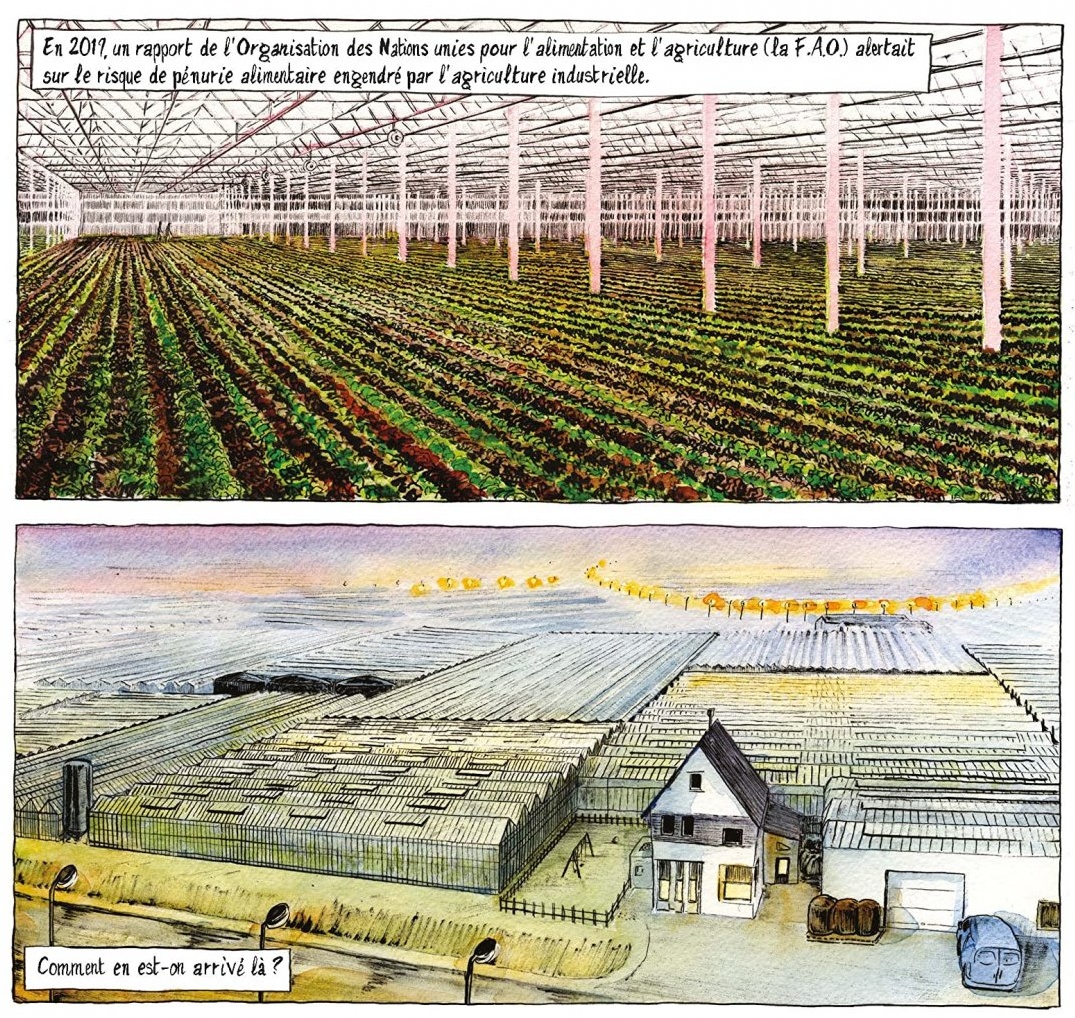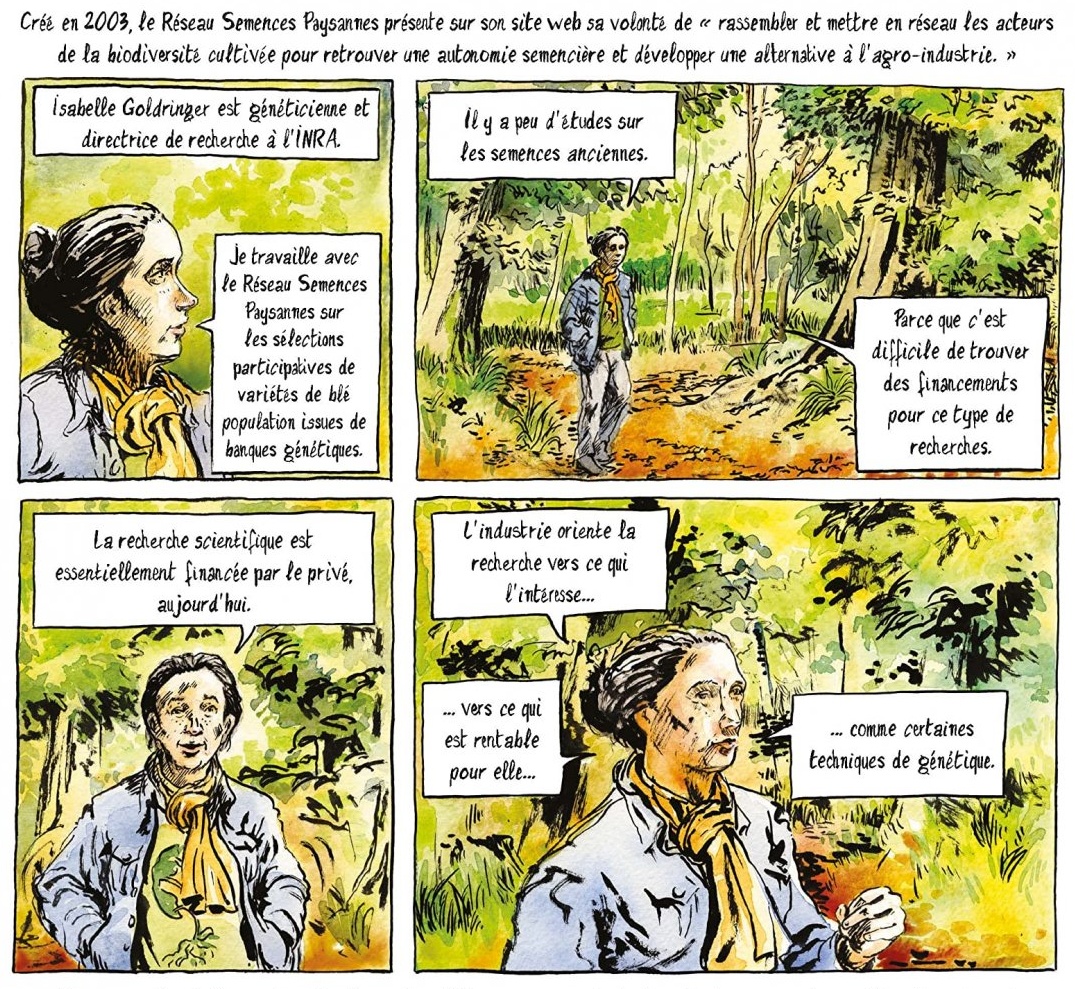Are GMOs the seed that hides the forest from genetic manipulation? In seeds under influence published by La Boîte à Bulles, Renaud de Heyn makes you think about the problem of genetic manipulation in agriculture.
A vital problem
 Since the ban on GMOs or the mad cow crisis, citizens are asking more and more questions about what they eat. The book opens with a shocking first sentence: "the overexploitation of our resources could cause the collapse of our civilization". The observation is even more chilling when the author lists the degradations caused by industrial agriculture. According to him, everything starts from the seed. To shed light on this idea, the scriptwriter and cartoonist Renaud De Heyn takes us on a journey from the Neolithic to the present day. Humans have always been looking for seed varieties and techniques to increase production. Agriculture progressed by observing nature, but everything is changed by the outside interventions of science and finance. Renaud de Heyn believes that we have passed a new milestone by moving towards productivism and the industrialization of "hybrid" seeds that harm the environment and health. Seeds under the Influence is a book full of information. This desire for precision and action is found in realistic drawing, but deliberately close to sketches taken on the spot. This raw side of the drawing illustrates the anger of the author that is found in the page numbers that are made by hand. The image also makes sense when we see the transformations of landscapes by mechanization. The script is not based on fictional characters or imaginary dialogue, but the author uses interviews and often his own text alongside the images.
Since the ban on GMOs or the mad cow crisis, citizens are asking more and more questions about what they eat. The book opens with a shocking first sentence: "the overexploitation of our resources could cause the collapse of our civilization". The observation is even more chilling when the author lists the degradations caused by industrial agriculture. According to him, everything starts from the seed. To shed light on this idea, the scriptwriter and cartoonist Renaud De Heyn takes us on a journey from the Neolithic to the present day. Humans have always been looking for seed varieties and techniques to increase production. Agriculture progressed by observing nature, but everything is changed by the outside interventions of science and finance. Renaud de Heyn believes that we have passed a new milestone by moving towards productivism and the industrialization of "hybrid" seeds that harm the environment and health. Seeds under the Influence is a book full of information. This desire for precision and action is found in realistic drawing, but deliberately close to sketches taken on the spot. This raw side of the drawing illustrates the anger of the author that is found in the page numbers that are made by hand. The image also makes sense when we see the transformations of landscapes by mechanization. The script is not based on fictional characters or imaginary dialogue, but the author uses interviews and often his own text alongside the images.
Another agriculture for another world
 Renaud de Heyn also shows in Semences sous influences that the intervention of science puts farmers under the dependence of large groups, often French. Science, but above all the industry, mass-produces seeds according to specifications decided by the agri-food industry and not for the health or taste qualities of the seeds. The State has set up an official list of seeds, but this choice leads to a gradual abandonment of local varieties. In addition, seed variety manufacturers register trademarks to reserve productive varieties for themselves. These powerful industries think above all about profit rather than health.This development is not just imposed from outside with the role of farmers' cooperatives. There is, however, an alternative, because there is no single agriculture. Faced with the excesses of agribusiness, small farmers are proposing to return to old seeds. This political choice comes up against the appetite of transnational corporations, but also with the law. We are witnessing timid progress, because organic criteria are now included in the official selection of seeds. Going beyond the rules of the Official Seed Catalogue, agroecological farmers acted illegally. We are following the tough legal battle to leave farmers experienced on traditional varieties. However, this anti-scientific view may seem reactionary. It would be possible that science would come to help these experimental research on the past like the attempts of INRA shown by the book. A true documentary in comics, Seeds under influences is a pamphlet that strikes the reader by showing the excesses of productivist agriculture, but Renaud de Heyn is not content to depress us with a list of problems. It highlights another agriculture more respectful of nature and ancient practices. Once the book is closed, all we have to do is look in the shelves for the products of these resistants. You can find other reports in comics on these links with circus artists and on the president of Turkey.
Renaud de Heyn also shows in Semences sous influences that the intervention of science puts farmers under the dependence of large groups, often French. Science, but above all the industry, mass-produces seeds according to specifications decided by the agri-food industry and not for the health or taste qualities of the seeds. The State has set up an official list of seeds, but this choice leads to a gradual abandonment of local varieties. In addition, seed variety manufacturers register trademarks to reserve productive varieties for themselves. These powerful industries think above all about profit rather than health.This development is not just imposed from outside with the role of farmers' cooperatives. There is, however, an alternative, because there is no single agriculture. Faced with the excesses of agribusiness, small farmers are proposing to return to old seeds. This political choice comes up against the appetite of transnational corporations, but also with the law. We are witnessing timid progress, because organic criteria are now included in the official selection of seeds. Going beyond the rules of the Official Seed Catalogue, agroecological farmers acted illegally. We are following the tough legal battle to leave farmers experienced on traditional varieties. However, this anti-scientific view may seem reactionary. It would be possible that science would come to help these experimental research on the past like the attempts of INRA shown by the book. A true documentary in comics, Seeds under influences is a pamphlet that strikes the reader by showing the excesses of productivist agriculture, but Renaud de Heyn is not content to depress us with a list of problems. It highlights another agriculture more respectful of nature and ancient practices. Once the book is closed, all we have to do is look in the shelves for the products of these resistants. You can find other reports in comics on these links with circus artists and on the president of Turkey.





































